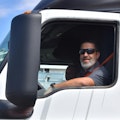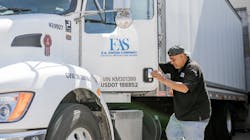The ability to monitor freight temperature is a must-have for refrigerated carriers who transport perishable products in the modern era, which dates to President Obama giving the U.S. Food and Drug Administration new power to protect the country’s food supply by signing the Food Safety Modernization Act in January 2011.
But only checking return air to measure the temperature inside a reefer trailer or truck body isn’t enough for many shippers. “That doesn’t always translate to actual product temperature—and that’s where CoreTemp comes into play,” said Steven Gessner, general manager for Eden Prairie, Minnesota-based E.A. Sween Co., a food manufacturer and distributor with six distribution locations and roughly 100 power units.
ERoad’s CoreTemp is a reefer monitoring solution that doesn’t rely on sensors packed into pallets, where they’re often lost or damaged, or manual probes. Instead, CoreTemp uses advanced algorithms to simulate product temperature fluctuations, ensuring constant, accurate reporting. By combining a network of sensors with artificial intelligence (AI), the software delivers actionable insights, like early multi-layer temperature warnings and alerts per compartment, and real-time breakdowns, helping keep compliance high—and costs low.
“It removes the human element from food safety,” said Shawn Enloe, E.A. Sween VP of final mile solutions.
Product development
CoreTemp’s development under the leadership of New Zealand native Craig Marris, EVP for general transport and cold chain at ERoad, dates to his time as co-founder of International Telematics, which introduced ibright telemetry-based reefer monitoring in North America in the mid-2000s. International Telematics merged with two other New Zealand companies, Imarda and Air-Trak, to form Coretex in 2015. Then ERoad, the largest telematics firm in New Zealand, acquired Coretex in November 2021.
With ERoad, CoreTemp developers—who started transitioning from wireless sensors to AI-based technology four years ago—gained access to greater scale and engineering capability, Marris said. “That accelerated where we focused our engineering dollars and talent, and certainly cold chain—and the CoreTemp solution in particular—is an area we’ve put a lot of effort into,” said Marris, who’s based in New York.
After working with shippers to finetune CoreTemp’s predictive capability, ERoad rolled it out with carriers who already had their hardware. Now it’s increasing commercialization by positioning the software as an “industry solution” with new fleets, equipment manufacturers, and competitors. “We’ve got CoreTemp to the point where it’s ready for the broader marketplace—after all the R&D, and making sure shippers get the information they need, and carriers understand how it works and can benefit,” Marris said.
ERoad upgraded CoreTemp with predictive shutdowns for transport refrigeration units (TRUs) in January. It’s also working on contextualizing data from integrated trailer subsystems, like antilock braking and tire inflation systems, and liftgates; and adding sustainability reporting as it works to create a “comprehensive” telematics solution. “A lot of carriers who have telematics now are reevaluating their systems, and they don’t want individual solution providers,” Marris said. “You’ve got to specialize in in-cab technology, integrated workflow, refrigeration, and dry van—and if you don’t offer the full suite, you’re going to turn over.”
Quality assurance
Earl August Sween founded E.A. Sween 68 years ago as a Stewart Sandwich franchise. Today, the company, now owned by Earl’s grandson, CEO Tom H. Sween, boasts its own brands, including Deli Express, and makes more than 1,500 fresh daily deliveries to convenience stores and grocery retailers with a fleet of 26-ft. International and Kenworth box trucks with multi-compartment Kidron reefer bodies.
The company has built workflows with Marris since his ibright days, so when leaders learned about ERoad’s CoreTemp, they were eager to offer it to their customers. “The history we’ve established with them definitely factored into our decision,” Enloe said. “We value long-term partnerships at E.A. Sween.”
E.A. Sween’s customers require their partners to operate under strict quality guidelines, like those outlined in the Hazard Analysis and Critical Control Point food safety system, so the company is using CoreTemp to provide real-time visibility into product temperatures. “Most of our trucks make 20 to 25 stops per night, and every time a driver opens the door, humidity flows in,” Gessner said. “Now we can see the return-air temperature is going up, but the product temperature is holding steady in the algorithm.
“It’s nice to have that assurance the product is safe even though we see those return-air spikes every time the cargo box or bulkhead door opens.”
E.A. Sween also uses ERoad for detailed route-monitoring, and it’s looking into implementing remote starts for reefer pre-cools.
Competitive advantage
CoreTemp’s effectiveness hinges on the “product profiles” created during implementation. ERoad collaborates with customers to establish temperature baselines for each product hauled, making sure to account for different product types, packaging, and conditions through probing, testing, and validation. “The hardest part from the beginning is developing the algorithm and ensuring accuracy is built in,” Maris said.
Gessner said he was impressed by the “thorough” weeklong process. ERoad product testers also developed safe temperature ranges by leaving E.A. Sween’s most sensitive products unprotected for extended periods of time. “It was very robust,” he said. “They plugged in tons of sensors, sent items out on a truck, and even took some home with them and left them outside—all to strengthen that product algorithm.”
E.A. Sween already had ERoad hardware, so installation was as easy as “flipping a switch,” Gessner added. Hardware installs typically take 45 minutes, Marris elaborated, but frequently are managed at the OEM level, where ERoad maintains integration partnerships with leading trailer manufacturers like Great Dane, Utility Trailer, and Wabash, and top TRU suppliers like Carrier Transicold, Thermo King, and Advanced Energy Machines. “We lease our trucks, so we’ve incorporated ERoad units into the build with Kidron,” Gessner confirmed. “Now, when the trucks are delivered, everything is installed and ready to go.”
Airtime runs $35 per truck, Gessner estimated, which is “not a bad deal,” considering the service includes customized dashboards, training, and access to dedicated CoreTemp staff. And Marris said shippers often pay for the service. “It’s the shippers who are asking carriers to put in telematics. But the reality is, if you’re a carrier who’s using telematics, adding CoreTemp provides a great return on investment, because of the increased productivity, decreased cost to serve—and confidence you’re meeting FSMA,” he said. “That’s a big deal."
“I can’t imagine competing in the marketplace today and not having something like that.”
About the Author

Jason McDaniel
Jason McDaniel, based in the Houston TX area, has nearly 20 years of experience as a journalist. He spent 15 writing and editing for daily newspapers, including the Houston Chronicle, and began covering the commercial vehicle industry in 2018. He was named editor of Bulk Transporter and Refrigerated Transporter magazines in July 2020.
